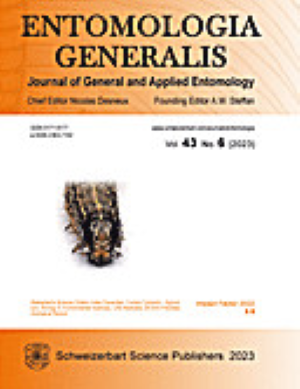Dose-response and sublethal effects from insecticide and adjuvant exposure on key behaviors of Trissolcus japonicus
IF 4.6
1区 农林科学
Q1 ENTOMOLOGY
引用次数: 0
Abstract
In its native range, Trissolcus japonicus (Ashmead) (Hymenoptera: Scelionidae) is a main egg parasitoid of Halyomorpha halys (Stål) (Hemiptera; Pentatomidae). Adventive populations of this parasitoid have been spreading in Europe and North America, allowing active distribution efforts in these areas to utilize it against H. halys in agriculture. We tested exposure of adults and parasitized egg masses to residues of a range of insecticides an adjuvant that the wasp could encounter in perennial horticultural crops, and how exposure might affect key behaviors. The insecticides included Burkholderia rinojensis, Methoxyfenozide, Sulfoxaflor, and Spinosad, and the adjuvant NuFilm®P. The lethal effects were investigated after exposure for 1, 6, and 24 hours to residues applied to Munger cells using a Potter spray tower to determine mortality levels. Sulfoxaflor and Spinosad resulted in 73% and 100% mortality after 24 hours at field rates, while Methoxyfenozide caused 19% mortality at the same rate. Little mortality occurred with Burkholderia rinojensis and NuFilm®P at recommended rates after 24 hours. Regarding sublethal effects, Spinosad, Sulfoxaflor, and Burkholderia rinojensis negatively impacted reproduction. Sulfoxaflor caused a lower angular velocity in parasitoids exposed to H. halys traces. Spinosad, Methoxyfenozide, and NuFilm®P induced a significantly lower overall circadian activity. Our results showed that precision timing of insecticide sprays to pests is necessary, especially for biocontrol programs that involve the release of parasitoids such as T. japonicus. Our results also illustrate how sensor data acquisition and behavioral analysis software can be utilized to detect important sublethal effects such as circadian disruption in minute parasitoids.杀虫剂和佐剂暴露对日本蓟马关键行为的剂量反应和亚致死效应
在其原生地,日本蓟马(Trissolcus japonicus)(Ashmead)(膜翅目:鞘翅目)是Halyomorpha halys(Stål)(半翅目;五蠹科)的主要卵寄生虫。这种寄生虫的入侵种群已在欧洲和北美扩散,因此这些地区正在积极传播,以便在农业生产中利用它来对付半翅目蚜虫。我们测试了成虫和寄生卵块与一系列杀虫剂和佐剂的接触情况,这些杀虫剂和佐剂是黄蜂在多年生园艺作物中可能遇到的,我们还测试了接触这些杀虫剂和佐剂会如何影响黄蜂的关键行为。杀虫剂包括 Burkholderia rinojensis、甲氧虫酰肼、Sulfoxaflor 和 Spinosad 以及佐剂 NuFilm®P。使用 Potter 喷雾塔将残留物喷洒在 Munger 细胞上 1、6 和 24 小时后,对其致死效果进行了调查,以确定死亡率水平。按田间用量计算,24 小时后,磺胺草酮和斯皮诺沙德分别导致 73% 和 100% 的死亡,而甲醚唑嘧啶按相同用量计算则导致 19% 的死亡。伯克霍尔德菌(Burkholderia rinojensis)和 NuFilm®P 按建议剂量施用 24 小时后,死亡率极低。关于亚致死效应,Spinosad、Sulfoxaflor 和 Burkholderia rinojensis 对繁殖有负面影响。Sulfoxaflor 会降低寄生虫接触 H. halys 痕量后的角速度。Spinosad、甲氧虫酰肼和 NuFilm®P 能显著降低整体昼夜节律活动。我们的研究结果表明,对害虫喷洒杀虫剂的精确定时是必要的,特别是对于涉及释放寄生虫(如日本蓟马)的生物防治计划。我们的结果还说明了如何利用传感器数据采集和行为分析软件来检测重要的亚致死效应,如微小寄生虫的昼夜节律紊乱。
本文章由计算机程序翻译,如有差异,请以英文原文为准。
求助全文
约1分钟内获得全文
求助全文
来源期刊

Entomologia Generalis
生物-昆虫学
CiteScore
7.10
自引率
18.80%
发文量
72
审稿时长
>12 weeks
期刊介绍:
Its scope covers all aspects of basic and applied research dealing with insects and more broadly with arthropods inhabiting wild, agricultural and/or urban habitats. The journal also considers research integrating various disciplines and issues within the broad field of entomology and ecology.
Entomologia Generalis publishes high quality research articles on advances in knowledge on the ecology and biology of arthropods, as well as on their importance for key ecosystems services, e.g. as biological control and pollination. The journal devotes special attention to contributions providing significant advances (i) on the fundamental knowledge and on sustainable control strategies of arthropod pests (including of stored products) and vectors of diseases, (ii) on the biology and ecology of beneficial arthropods, (iii) on the spread and impact of invasive pests, and (iv) on potential side effects of pest management methods.
Entomologia Generalis welcomes review articles on significant developments in the field of entomology. These are usually invited by the editorial board, but proposals may be sent to the Editor-in-Chief for preliminary assessment by the editorial board before formal submission to the journal. The journal also considers comments on papers published in Entomologia Generalis, as well as short notes on topics that are of broader interest.
 求助内容:
求助内容: 应助结果提醒方式:
应助结果提醒方式:


